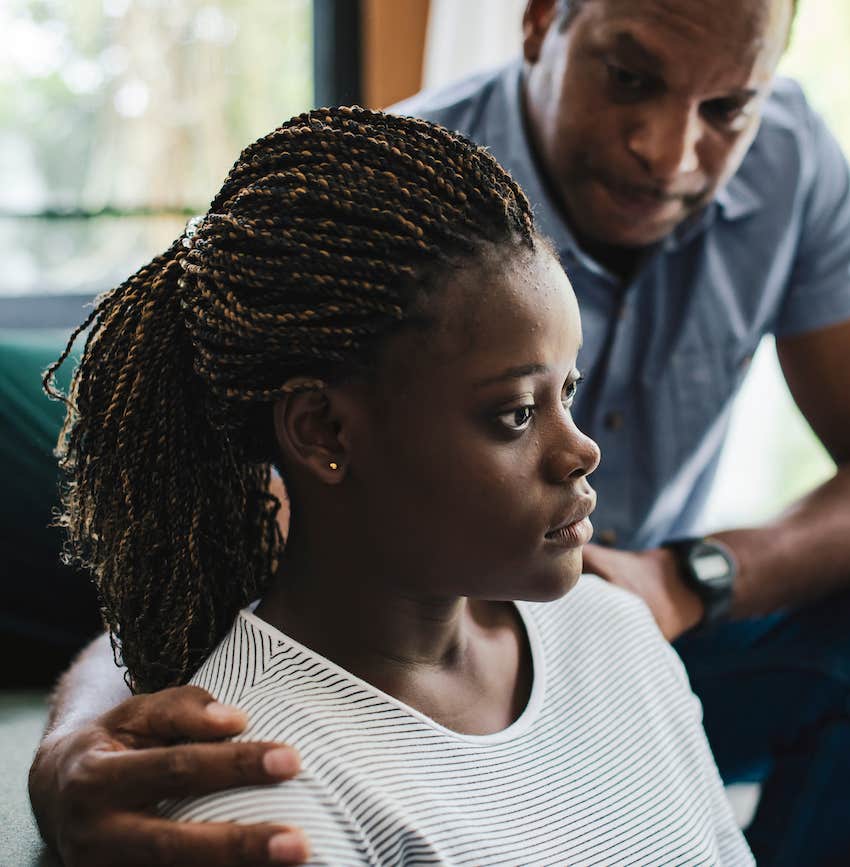The Most Powerful Phrase You Can Possibly Say To Someone Who Is Struggling
Go a few notches deeper in understanding.
 RDNE Stock project | Canva
RDNE Stock project | Canva My toughest audience yet: 50 San Francisco high school seniors two weeks short of graduation. They're a striking, multiracial mix of kids straight out of a Gap billboard ——united by their desire to be somewhere else on this gorgeous spring day. Instead, their teacher tells them they will spend the next hour with a representative of the state's anti-stigma campaign, someone with a mental illness, and the parent of a mentally ill son.
Get me out of here, I read on all their faces. When I begin by asking the group if anyone can define "mentally ill," the answers come in unison, "Crazy. Nuts. Psycho."
I'm not insulted. My job is to take them a few notches deeper in their understanding. To give them enough knowledge about mental illness so they'll know how to get help if they should ever need it or assist a friend who might be experiencing symptoms.
 Josep Suria via Shutterstock
Josep Suria via Shutterstock
I borrowed a story from another speaker in our SOLVE campaign (as described in the American Journal of Public Health). Julie is a 20-something woman with bipolar disorder. She had stunned me, as she does with even the most jaded listeners, the first time I heard her account of the night she went to the Bridge (The Golden Gate for non-locals) and how she got to the railing fully intending to make the jump. Her depression had raged for weeks, and she just wanted out. As Julie tells it, seconds before she was going to jump, along came a bridge cop.
He uttered the most powerful phrase you can possibly to someone who is struggling: Do you need someone to talk to?
Such gentle, simple words, magical and breathtaking in their power. Julie tells how she surprised herself when she answered "yes" and talked nonstop as the policeman walked her to the bridge office.
Curiosity now fills the formerly blank faces in my audience.
I go on to tell them about my son Alex's diagnosis of schizophrenia at age 17, exactly their age, the approximate age when most schizophrenics experience their first psychotic symptoms, as supported by research published in Schizophrenia Bulletin.
I read to them from Alex's journal describing the day he was too paranoid to stay in class.
I sat down behind a dumpster, declared it my kingdom, and began drawing soldiers. I drew an angel with eyes and tits. I drew knights to fight my holy war. I began to forget that I was back there cause I was scared of the world.
I explain some of what had led up to Alex's first psychotic break. The weeks of pot smoking, months of disorientation, an inability to sleep, disordered (strange) thinking, incoherent speech, and his withdrawal from everyone and everything he loved.
Their questions come in waves:
"Did your son smoking pot make him get schizophrenia?" (It helped trigger it.)
"How's he doing now?" (he stayed on medication for a few years, and now he's finished college and working in his field and, no, he doesn't smoke pot anymore, by choice) I tell them about PREP (Prevention and Recovery from Early Psychosis), the new clinic at UCSF for treating early psychosis in young people to prevent schizophrenia from developing into a full-blown disease. A study in Early Intervention in Psychiatry Journal describes the development of the clinic.
"My friend told me once he wanted to die, what should I have said?" (Listen first, let him know you care, and then try to get help from a school counselor or another adult)
 Rawpixel.com via Shutterstock
Rawpixel.com via Shutterstock
Sweet. That's the word that comes to mind when I think about those teenagers who were probably my most gratifying audience in the 30-odd presentations I've given this past year. That is once the veil of the unfamiliar had come down, once mental illness was put in terms they could relate to by telling stories of people like them. Then, they were ready to learn and help in whatever way they could.
Beginning with listening, the truth brings down barriers. People recognize it and listen readily if we dare to speak it.
The California anti-stigma campaign is called SOLVE, Sharing Our Lives, Voices and Experiences, begun by the Mental Health Association of San Francisco, on whose board I sit. SOLVE continues and grows to other parts of our state, funded by one of those great California creations, Prop 63, now the Mental Health Services Act (MHSA). This tax on millionaires has now amassed billions of dollars with funds used for local mental health services to compensate for severely gutted county public mental health budgets, as well as for PREP and new suicide prevention programs. Rebecca L Collins, Ph.D. led a study to observe some of the results from the SOLVE campaign.
If you or somebody that you know is experiencing a mental health crisis, there is a way to get help. Call SAMHSA’s National Helpline at 1-800-662-HELP (4357) or text "HELLO" to 741741 to be connected with the Crisis Text Line.
Victoria Costello is an author, speaker, and educator who brings together and translates the best science available on family wellness with an emphasis on emotional and mental health. She offers this expert information to parents and others in a form they can use today.

